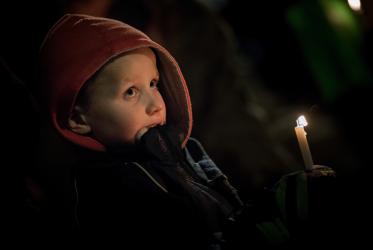by Kristine Greenaway
Hosting the meeting of the World Council of Churches (WCC) Central Committee in Trondheim, Norway, has proven to be a gift to the Church of Norway, according to a senior church official.
“Coverage of the WCC’s work on issues like gender justice and climate change has allowed us to show the public that the church is relevant in new ways,” says Berit Hagen Agøy, General Secretary of the Church of Norway’s Council on Ecumenical and International Relations.
The Church of Norway offered to host the meeting because of its long-established commitment to global ecumenism and to the World Council of Churches. It has proven to be an opportunity to both give and receive, the senior church leader acknowledges.
“The meeting has helped the Church of Norway understand that we are part of the global, ecumenical church. This identity is extremely helpful to us as we move from being an establishment church to being independent,” Hagen Agøy notes.
The theme of the meeting, “Pilgrimage: Discerning the Landscapes Together,” made Trondheim the ideal location for the meeting. The city has a centuries-old tradition of welcoming pilgrims on the St. Olav Way.
“Connecting pilgrimage to the idea of moving toward justice and peace adds substance and a new dimension,” Hagen Agøy says.” It moves us in Norway to think of pilgrimage as more than individual spiritual enrichment by broadening pilgrimage to include the opportunity to do something concrete in the world.”
Hagen Agøy notes too that this approach to pilgrimage links to the Church of Norway’s vision of “More Heaven on Earth.”
The senior church official has managed the process of making arrangements for the WCC’s meeting of 368 participants, who met between 22 and 28 June.
Financial support from the Ministry of Culture helped covers additional costs involved in hosting a large international gathering in Norway.
“Norway is proud of its involvement in global matters, and WCC’s work has credibility,” Hagen Agøy explains. “We made the case that having the Central Committee meet here would be good for the country’s image.”
Gunn Karlsaune, Diocesan Director for the Diocese of Nidoras, worked with Hagen Agøy handling local logistics. This involved helping WCC staff to identify a venue and invite local churches to host Central Committee worship services. Her work included coordinating plans for the St. John’s Eve celebration that gave WCC visitors a taste of the Norwegian traditions that mark midsummer.
“People here have been enthusiastic,” says Karlsaune. “Local goodwill makes a lot of difference.”
Even so, handling logistics was no simple matter. When planning was well underway, Hagen Agøy and Karlsaune learned that the country’s Royal Family would be in Trondheim at the same time as the Central Committee. The 25th anniversary of their consecration (coronation) coincided with the second day of the WCC meeting. Security clearance was obtained for all WCC participants, protocol arrangements were made, and work continued.
“The staff of the WCC did most of the planning,” says Karlsaune, modestly underplaying her own involvement. “They told us what they needed, and I put them in touch with the right people during their advance trips to Trondheim.”
Careful planning and invitation letters from WCC’s General Secretary and the Presiding Bishop of the Church of Norway meant that there were few problems with entry visas for participants coming from 81 countries for the meeting, a factor that places Norway among a small group of countries with such welcoming immigration procedures for international gatherings.
Karlsaune says that, although there was a lot of work involved in hosting the Central Committee meeting, she feels it was worth it. “On the opening day, seeing all the people, I said, ‘we did it! They are all here!’” she exclaims.
More information:



![Image[1].jpeg](/sites/default/files/styles/teaser/public/photoshelterCopy/Image%5B1%5D.jpeg?h=44590859&itok=LMAXVRC6)


